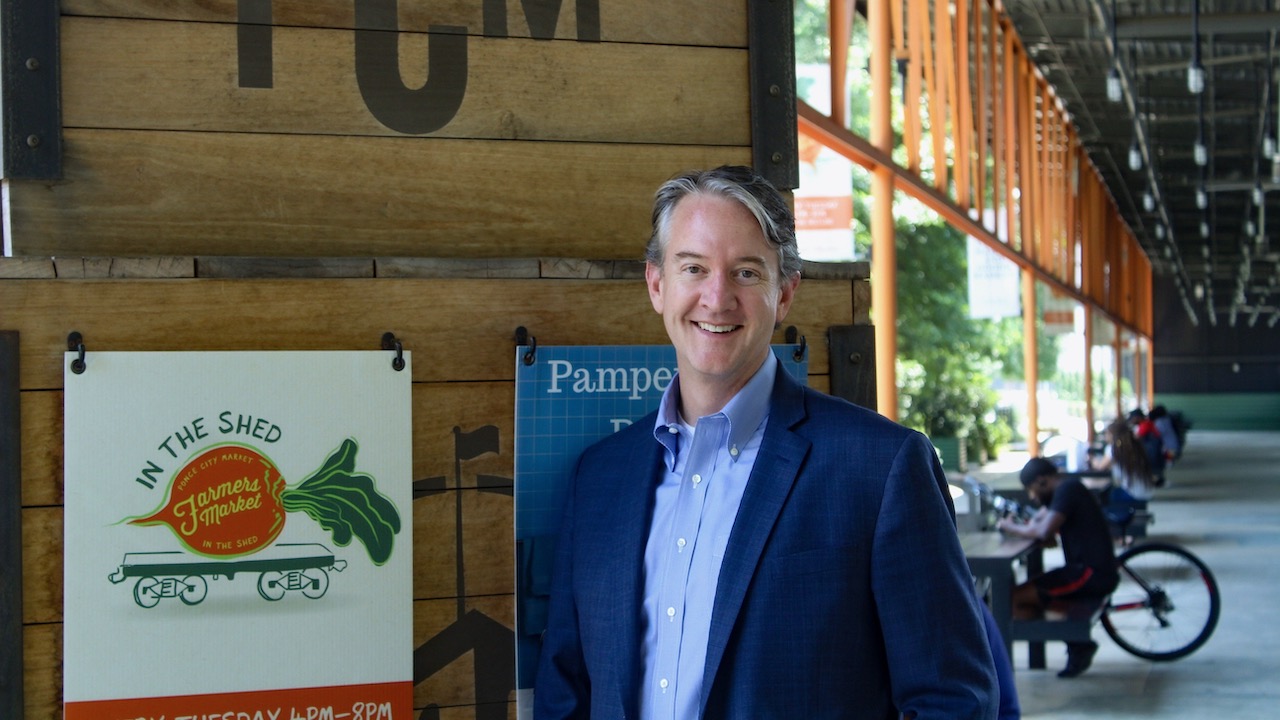content body
Speaking with Troy Harris quickly reveals two things for which he is passionate: the forestry industry and Auburn University.
During his interview, Harris showed off the Auburn Creed tacked to his office note board, a practice he has repeated throughout his career.
“The Creed starts off ‘this is a practical world,’ and I believe that. It advises you must be honest and have integrity and have a ‘spirit that is not afraid.’ I was not afraid to jump and try a new thing,” Harris said, referring to his unique career transitions.

Auburn alumnus Troy Harris is featured at Ponce City Market, the adaptive reuse project Jamestown constructed in downtown Atlanta.
From pre-med to forestry?
Raised in Oregon, becoming an Eagle Scout meant being outdoors was a huge part of Harris’ upbringing. A move to the South his sophomore year in high school introduced him to Auburn, and he knew Auburn “was the place, the type of campus he wanted to be on.”
Oddly enough, Harris went to Auburn for pre-med, but during registration decided he did not want to be in school that long.
“I thought maybe I should do what makes me happy, and off I went to forestry. The career path has been great, and I have never looked back,” Harris said.
Harris graduated from the College of Forestry, Wildlife and Environment in 1992 with a bachelor’s in forestry and a minor in business administration.

Auburn alumnus Troy Harris hugs a mass timber beam during construction of 619 Ponce, Georgia’s first locally sourced mass timber building Jamestown constructed in Atlanta.
From dirt forester to business leader
Currently, Harris is managing director of Timberland and Innovative Wood Products at Jamestown, and his enthusiasm for this position is apparent. But that’s not where he started.
“My professional evolution seems to mimic the evolution of the forest and timber industry,” he said.
Following graduation from Auburn, Harris worked for Union Camp, a large paper company, as a dirt forester, which entailed being in and caring for forests. The paper companies, especially in the South, owned and managed most of the timberland, and the foresters managed the land for them.
In the late 90s, pulp and paper companies began realizing they needed to focus on making pulp and paper and did not need to own the timberland because there were institutional investors willing to purchase the timberland as an asset class that would continue to grow timber and supply the mills with their needs.
“I noticed this transition, and I jumped ship early from pulp and paper companies and joined timberland investment management organizations (TIMO), who were basically going to become the next owners of the timberland asset class,” Harris said.
In this new role, Harris built funds for managers investing in timberland and managed those funds, still with his foot in the timber space as his skillset evolved more on the business side of forestry.
“The most fun thing about being a forester now is that foresters were once seen as the evil villains that cut down trees,” Harris said. “But it has been exciting to be a forester in the last few years as people realize taking care of your forest enables the forest to be healthy and survive.
“We are becoming understood by society.”

Auburn alumnus Troy Harris discusses construction with colleague in 619 Ponce, Georgia’s first locally sourced mass timber building Jamestown constructed in Atlanta.
In pursuit of innovative solutions
With innovative solutions, Harris joked that foresters are finally becoming “the cool kids in the room.”
This especially rings true when you look at 619 Ponce, a mixed-use office and retail building Jamestown built using engineered mass timber, located next to their adaptive reuse Ponce City Market project in downtown Atlanta.
The need for engineered mass timber becomes evident when we think about global emissions, explained Harris, who stated globally about 40% of carbon emissions are caused by the built environment, with 11% of that rooted in the products with which we build.
“Traditionally, steel, concrete and other construction products are huge emitters of carbon,” he said. “If we change how we build, we could have a huge impact on reducing carbon emissions, so we started connecting the dots.
“We can build mass timber buildings, reduce our carbon footprint and create a unique and beautiful product.”
And that is exactly what Harris and his Jamestown team did — create a locally sourced “farm-to-table” building, sourcing and processing the timber in Georgia, manufacturing the wood in Alabama and constructing the building in Atlanta.
Jamestown tells the story of 619 Ponce on the Seedlings to Solutions website and at the “mass timber pop-up” within the building.
“People can come by and see it, interact with it and feel its sturdiness,” Harris said. “We want people to learn about this material and understand this building shows a 75% reduction in carbon emissions when compared to concrete and steel buildings.”
A storytelling forester?
A substantial part of Harris’ job is telling the story of innovative wood products and the impact they are having on the forestry industry.
“Many foresters got into forestry because they wanted to be in the woods, not in front of people,” Harris said. “But all of the sudden, we are the cool kids in the room, and people are listening. We have an opportunity to tell this innovative sustainability story, and that’s really exciting.
“I am passionate about mass timber, the timber industry and being a forester.”
The Auburn Mass Timber Collaborative is an interdisciplinary collaboration between colleges to advance research, education and outreach in mass timber design and construction with a focus on the forestry, architecture, engineering and construction industries in the Southeast.
Learn about cross-laminated timber and other sustainable mass timber products at the Auburn University-hosted CLT conference, “The Sustainable Future of CLT in the South: Grow. Design. Build.” taking place from Oct. 7-9, in Auburn, Alabama.
Passionate about innovative wood products? Attend Auburn’s CLT Conference.
Register now



